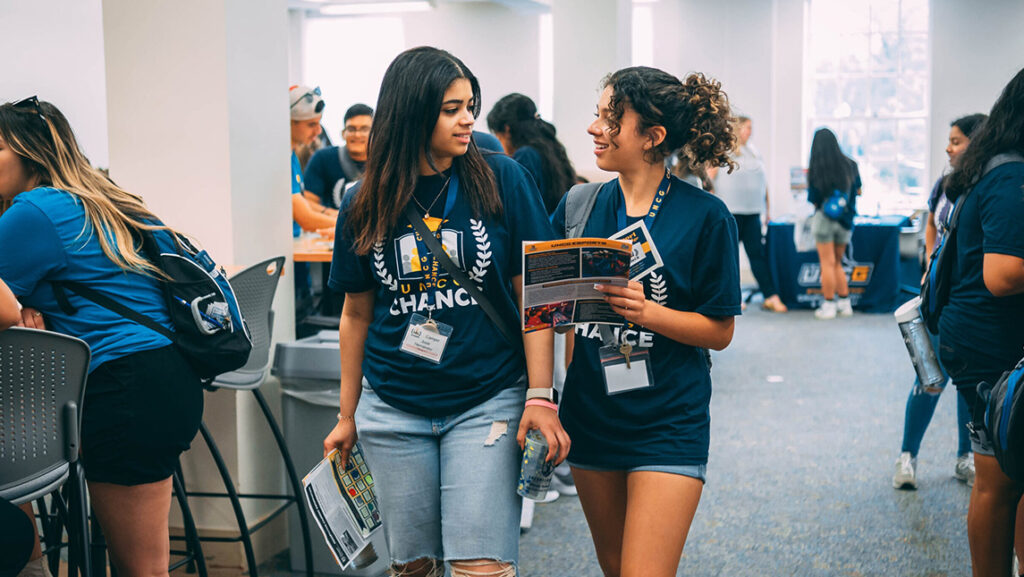In 2019, Charlotte-Mecklenburg Schools (CMS) declared that “students deserve access to, and success in, a rich and diverse curriculum…along with a well-equipped media center staffed by a qualified media specialist.” At the time, 40% of the district’s schools were without a dedicated library or media specialist.
To fill the vital need for certified librarians – known as media coordinators – CMS tapped the University of North Carolina Greensboro and its highly ranked online master’s in library and information science program (MLIS) to accept a qualified cohort of 10 teachers. The cohort, all currently teachers in CMS, have completed the first of six semesters of online courses as they work to complete their MLIS degrees. A pilot program aimed at recruiting and retaining teachers, CMS is funding tuition costs for each cohort member. In exchange, the teachers earn their MLIS degrees and pledge to stay with CMS for a minimum of two years.
“Our partnership with UNCG is an essential element of our efforts to recruit and retain highly effective School Library Media Coordinators in Charlotte-Mecklenburg Schools,” says Kimberly Ray, director of Digital Learning & Library Services for CMS. “The lack of certified library media coordinators in a number of our schools constitutes a provision gap-one that we are committed to closing so all our students have access to the benefits a school librarian provides. After only one semester following the launch of this collaboration, already the positive impact has been felt by several thousand students who now have access to a school librarian enrolled in a high-quality library program.”
The case for school librarians
In 2019, CMS identified 60 schools without a school library or dedicated media coordinator that were underperforming on reading and math test scores. They learned that the issue of waning school librarians is not unique to their district.
A national study published in January 2023 identified the decline of school librarians as “a growing issue of social justice and educational equity.” The study states: “In school year 2021, three million students in majority nonwhite districts were without any librarians…the gap between students in districts with a ‘library privilege’ and those without librarians continues to widen.”
In addition to impacting students’ ability to achieve higher levels in reading and math, the media coordinators are on the front lines of ensuring digital media literacy. They are a trusted resource in discerning online safety for students and the broader school community.
“When there is no librarian in place to help provide resources for teachers or support instruction that challenges students, the students go without, and therefore do not achieve at that higher level,” says Tammy Gruer, associate chair, school library program coordinator and clinical assistant professor in UNCG’s Information Library and Research Science department.
“It’s not just about books, it’s about safe and effective use of digital information, how to use a database, how to develop digital citizenship skills,” says April Dawkins, assistant professor in the Information, Library and Research Sciences department. “These students have a lot of access, but tools like Google are like drinking from a fire hose. A librarian helps students and teachers research more effectively and efficiently; and teaches them those vital skills.”

UNCG addressing needs in real-time
UNCG has built a reputation for addressing education equity gaps in real-time, with access to continuing education that works for teachers and school systems. Following the model of IPie’s Math and Science Teachers of Tomorrow, or MST2, which addresses the need for more STEM-trained teachers in Guilford County Schools, the MLIS program piloting this year will have real impacts for CMS teachers and students.
The cohort consists of 10 teachers in schools across the district that need a media coordinator. Many of them have already transitioned from classrooms or administration to the library. Through UNCG, their courses in the MLIS program are directly applicable to their positions in real time.
“This semester, I took on projects for my MLIS coursework that contribute to what I’m doing at school,” says Katie Lock, cohort participant and media coordinator for Cotswold Elementary School. “I created a LibGuide – an online, curated collection of resources – specifically for a fifth grade class who was doing a massive research project on natural disasters. I learned how to create a LibGuide and used the real need of my fifth graders as the example in the project. Just that one skill already directly applies to what I’m doing in my job.”
“My school has been without a media center coordinator since October of 2022,” says Regina Meeks, MLIS cohort participant and educator at South Pine Academy. “I’m glad that CMS recognized the importance of a media coordinator because we provide that concentrated effort that supports literacy, engagement, and overall enjoyment of reading as well. The media center is the core of the school because of how we branch out to the different grade levels, support the curriculum in classrooms, and aid those teachers with literature, games, and research that augment their lessons.”
Direct application of the degree work is exactly what CMS and UNCG leaders had in mind for the MLIS cohort. In addition to the coursework, administrators are working on other efforts to support the group as they go through the program and continue to work full-time in their schools.
“The cohort are from 10 schools in CMS that need a librarian. CMS is working to potentially provide some professional development days for the cohort to collaboratively work on projects from their coursework,” says Gruer. “We’re very proud of our program here at UNCG. The cohort will leave with an accredited masters of library science and will be primed to apply for their K-12 teaching license or educator license in school library media.”
Community and camaraderie create a culture model for the future
Perhaps one of the most valuable aspects of the MLIS cohort is the friendship and fellowship the 10 members have formed – a culture of connection between teachers across schools in CMS.
“I would strongly recommend anybody going into an academic program to try to create your own cohort,” Lock says. “Having the support of nine other teachers who know the stress, assignments and responsibilities is an invaluable connection. We make each other stronger.”
“It’s an amazing program,” agreed Meeks. “We’re learning a lot. We’re growing. It gives us the opportunity to support our students and our teachers. I’m humbled and thankful CMS wants to make this investment in us.”
The hope is this first MLIS cohort will impact the culture across CMS so that teachers and coordinators continue work in tandem to strengthen their programs. The pilot program is a first step in filling the equity gap and working toward a model for student and school achievement academically and culturally.
“A school librarian is someone who sees the whole school and serves every student in the school. They can see the big picture and that is important when you’re trying to serve every student, every faculty,” says Dawkins. “A reading culture is built when students have more access and choice around their reading materials. Dedicated media coordinators teaching digital literacy skills and recreational reading are vital to helping students develop a love of learning.”
CMS funding and advocacy for the next MLIS cohort program are in process. The goal is to train up to 30 additional media coordinators to address open positions across the Charlotte-Mecklenburg School system.
Story by Alice Manning Touchette
Photography by stock.abobe.com




